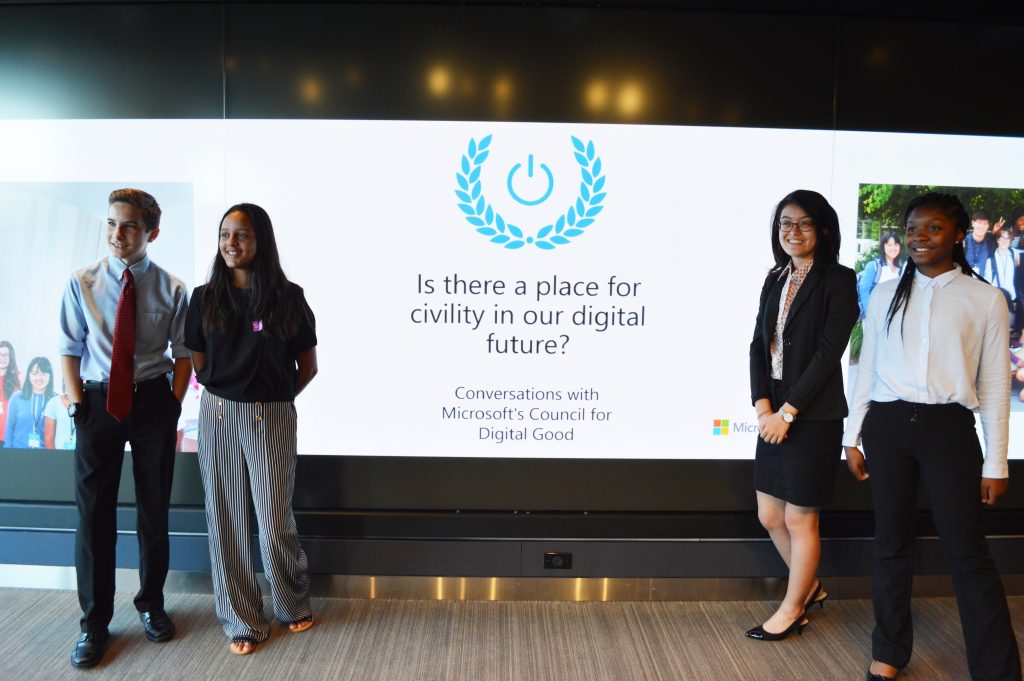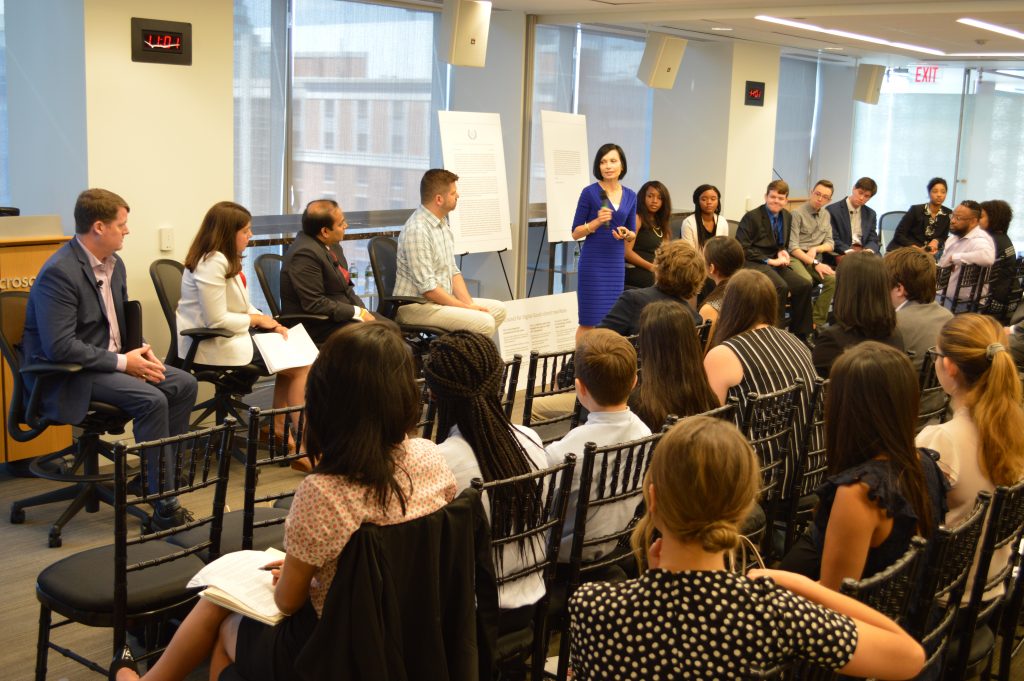In an open letter to U.S. law- and policy-makers, Microsoft’s Council for Digital Good is calling on government to address digital-world realities like cyberbullying and “sextortion” by modernizing laws and promoting in-school education to encourage positive online behaviors.
“As young people who have encountered some of these problems firsthand, our goal as the Council for Digital Good is to provide strategies, solutions and resources for other young people in these situations,” council members wrote. “For our sake and for that of future generations, it is imperative that we amplify discussions about making the internet a more productive, civil, and safe place.”
The letter, shared last week at an event featuring the 15-member council at Microsoft’s Innovation and Policy Center in Washington, D.C., touts the benefits of awareness-raising of digital risks. The council also recommends that in-school online safety and behavioral education be supported and prioritized, and requests that laws be updated and brought into the digital age. The letter and its recommendations to policymakers is the culmination of the council’s work after 18 months of other assignments, activities, learning and fun. In addition to the council members and a parent or chaperone who accompanied each of them to the event, the young people also hosted leaders from other technology companies, non-governmental organizations and D.C.-area influentials.
Youth shine in the nation’s capital
The event, “Is there a place for civility in our digital future? Conversations with Microsoft’s Council for Digital Good,” featured two panel discussions, comprised of teens sharing their work and views, and two sets of three adult panelists, each responding and reacting to the young people’s presentations. The first panel focused on the state of online civility today and included Christina W., Jazmine H., Judah S. and Miosotis R. These four young people, ages 14 to 17, went above and beyond their regular council assignments, taking it upon themselves to speak in their schools and communities on or around international Safer Internet Day this past February. They then brought those learnings to this panel discussion.
From left, Judah S., Miosotis R., Christina W. and Jazmine H. following their panel discussion.
Christina spoke of the rewarding experience it was to see parents interact with one another after hearing her guidance for staying safer online; Jazmine noted the importance of awareness-raising and education among all groups; and Judah highlighted the importance of respecting age requirements on social media. Miosotis talked about her peer-to-peer outreach in both Florida and Puerto Rico. The adult respondents from Google, Born This Way Foundation and Columbia University were impressed by the young people’s drive, determination and knowledge of the issues.
The second panel focused on building and growing a culture of digital civility. Indigo E., Jacob S. and Sierra W. presented the cohort’s written manifesto for life online first released in January, while Bronte J., Rees D. and William F., unveiled the open letter. Adult respondents from Snap, Inc., Tyler Clementi Foundation and UNICEF posed some provocative and important questions and offered instructive advice for reaching policymakers with their message.
Jacqueline Beauchere summing up after a second panel with Council for Digital Good members and adult respondents.
Erin R., Robert B. and Isabella W. showcased their individual art projects, and Katherine C. and Champe S. shared highlights from their council experiences, and assisted me in opening and closing the event, respectively. These 11 council members range in age from 14 to 18.
“The CDG council members are impressive and inspiring,” said retired U.S. Ambassador Maura Harty, president and CEO of the International Center for Missing and Exploited Children, who attended the event. “Their kindness and maturity are matched by their desire for effectiveness. With their manifesto, they have provided a well-considered road map and a path to greater digital civility for all of us. Emphasizing awareness, skills, and yes, ethics and etiquette, they have modeled the behavior we all should emulate.”
Program highlights importance of the youth voice
We assembled this impressive group as part of a pilot program in the U.S., launched in January 2017. The council served as a sounding board for Microsoft’s youth-focused, online safety policy work. Prior to last week’s event, the council met for a two-day summit last August where they each drafted an individual manifesto for life online. They were then tasked with creating an artistic or visual representation of those written works. The written cohort manifesto and a creative cohort manifesto followed, all leading up to the crafting of the open letter and the youth assuming a more visible role as a full group.
As I’ve mentioned before, we thought the in-person portion of the program would conclude after the August summit. But after meeting these youth, we knew it would be a missed opportunity not to bring them together again and in a more public way. We wanted others to appreciate their passion and perspectives and to hear from them in their own words. Indeed, for us at Microsoft, the program underscores the importance of the youth voice and the need for young people to have a say in policy matters – be they governmental or corporate – that affect them. We shared a lot and we’ve learned even more from these youth. I’m planning a more reflective account of the full program soon.
Following the D.C. event, first lady Melania Trump met with the council members, and spent time with each teen personally to learn about their individual creative projects and to hear about the cohort’s 15 online safety tenets.
Afterward, we held a brief capstone event, where we honored each council member for his or her unique contributions to this pilot program. We are excited to learn that many council members want to stay involved in these issues and to remain in contact with us at Microsoft and many of our partner organizations.
As the youth concluded in their open letter: “Now is the time for action, and we need your help in the push for change in online culture. If we gain the ability to always harness the internet in a positive and productive way, we will be able to use our generation’s signature swiftness, effectiveness, and global platform to make a difference.”
Learn more
Read the council’s full open letter here; view all of their individual, creative projects at this link, and learn more about digital civility by visiting www.microsoft.com/digitalcivility. Look for our latest digital civility research releases leading up to Safer Internet Day 2019 in February and, until then, follow the Council for Digital Good on our Facebook page and via Twitter using #CouncilforDigitalGood. To learn more about online safety generally, visit our website and resources page; “like” us on Facebook and follow us on Twitter.
At the time of writing of this post, Jacqueline Beauchere’s title was Chief Online Safety Officer.



